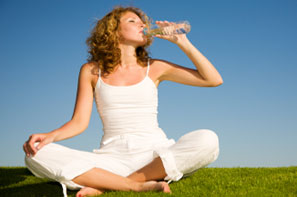Tips for lowering cholesterol
Leave a CommentGood news for the humble egg this week. They are officially good for your heart! The cholesterol in eggs has a minimal effect on serum cholesterol levels according to the British Nutrition Foundation and scientists have proved that eggs produce proteins that mimic the action of blood pressure-lowering drugs. Eggs may in fact be good for your heart by lowering blood pressure in the same way as Ace inhibitors, taken by millions around the world. These drugs lower blood pressure by stopping the hormone angiotensin narrowing the body’s blood vessels.
Researcher Professor Bruce Griffin, of the University of Surrey, said: ‘The ingrained misconception linking egg consumption to high blood cholesterol and heart disease must be corrected.’
As I’m forever correcting my patients about their fear over egg consumption – this is great news and one that will hopefully filter through to the nation. One of the most sustaining and healthy breakfasts is scrambled eggs on toast. Not only is it a brilliant low GI meal, but it will prevent any hunger pangs mid morning. People rely far too much on sugary based cereals and toast every morning and forget about the importance of protein.
Many of my clients are still very confused about cholesterol and what foods make it worse or better. The most common misconception is that all fat is bad for you. That simply isn’t the case, and its important to keep eating essential fatty acids i.e. omega 3 and 6 in the diet. Essential Fatty Acids reduce your ldl (bad cholesterol) and thin the blood. Many of the eggs we buy are fed on Omega 3 rich feed.
It is important after 40 to know what your cholesterol levels are and particularly the ratio of good (HDL) to bad (LDL). If you have just had your cholesterol tested and its slightly raised and you would like to try diet and exercise before statins here is my advice. Give yourself eight weeks and then get it tested again.
Top tips to help lower cholesterol
Avoid all saturated fat and cholesterol in the diet – choose chicken, fish, tofu and pulses over red meat. Particularly avoid pork and pork products, fried and fatty food.
Avoid all hydrogenated fats – this means you will need to start reading labels.
Use a scrape of butter or margarines that contain plant sterols,
Cut out all alcohol, cakes, carbonated drinks, coffee, refined food (white flour and white sugar.
Take regular exercise and avoid stress where possible.
Do not eliminate all good fat from the diet so do include oily fish, nuts and seeds in your diet.
When eating nuts make sure they are raw rather than dry roasted etc and almonds are especially good as they are high in arginine.
Use cold pressed oil to cook with e.g. olive, soybean, flaxseed that have never been heated over 110oF.
Increase your fibre in the forms of fruit, vegetables, and whole grains as this can reduce serum cholesterol. Choose brown rice and psyllium husks, oats, and barley.
Garlic is amazing for reducing cholesterol, and can be taken raw (do be careful though!) stir fried, roasted or in supplements. Other foods known to reduce cholesterol include apples, carrots, oily fish, pulses, grapefruit and olive oil.
[digg=http://digg.com/health/Tips_for_lowering_cholesterol_and_good_news_for_the_egg]




 I am constantly reminded in my job how much stress affects our health. This year alone I have seen numerous clients with serious stress situations in their life. Although I’m a nutritionist, and not a councillor, its important for me to listen to the problems my clients are having as this helps me support them with diet and supplements.
I am constantly reminded in my job how much stress affects our health. This year alone I have seen numerous clients with serious stress situations in their life. Although I’m a nutritionist, and not a councillor, its important for me to listen to the problems my clients are having as this helps me support them with diet and supplements. Some foods directly stimulate a neurotransmitter response for instance carbohydrates influence serotonin production and caffeine stimulates adrenaline synthesis. There are many other specific vitamins and minerals that have a powerful effect on your mood. Without proper neurotransmitter balance brain function and mood can be seriously affected. Feelings of anxiety and stress are commonplace in today’s society. The body’s stress response has not yet evolved to deal efficiently with modern life, meaning the slightest emotional stress still causes a powerful release of chemicals. Two minerals, calcium and magnesium play an important role in regulating your nervous system. By making sure you have adequate dietary intake of these two nutrients you can help yourself combat feelings associated with stress and induce calmness and relaxation. GABA restores calm after a stressful event, helping you to relax. Another called dopamine enables your body to deal with stress more efficiently, helping to reduce feelings of anxiety.
Some foods directly stimulate a neurotransmitter response for instance carbohydrates influence serotonin production and caffeine stimulates adrenaline synthesis. There are many other specific vitamins and minerals that have a powerful effect on your mood. Without proper neurotransmitter balance brain function and mood can be seriously affected. Feelings of anxiety and stress are commonplace in today’s society. The body’s stress response has not yet evolved to deal efficiently with modern life, meaning the slightest emotional stress still causes a powerful release of chemicals. Two minerals, calcium and magnesium play an important role in regulating your nervous system. By making sure you have adequate dietary intake of these two nutrients you can help yourself combat feelings associated with stress and induce calmness and relaxation. GABA restores calm after a stressful event, helping you to relax. Another called dopamine enables your body to deal with stress more efficiently, helping to reduce feelings of anxiety. 2. Remember to stay well hydrated on 1.5 litres of water daily, this can include green tea, or redbush and fruit juice. Try and avoid caffeine and colas as this may only make you more anxious and nervy. Cammomile tea is good for anxiety, and peppermint and fennel tea are good for indigestion and nausea.
2. Remember to stay well hydrated on 1.5 litres of water daily, this can include green tea, or redbush and fruit juice. Try and avoid caffeine and colas as this may only make you more anxious and nervy. Cammomile tea is good for anxiety, and peppermint and fennel tea are good for indigestion and nausea. 6. Inflammatory conditions like asthma, eczema or skin disorders can flare up. Its important to keep your levels of omega 3 up – either by eating salmon, mackeral, herring or sardines three times a week or take flaxseed oil if you are vegetarian.
6. Inflammatory conditions like asthma, eczema or skin disorders can flare up. Its important to keep your levels of omega 3 up – either by eating salmon, mackeral, herring or sardines three times a week or take flaxseed oil if you are vegetarian.
